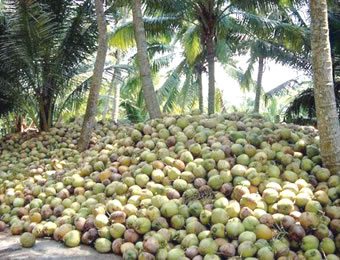Decades back, Badagry town was known for its great economic power as a coconut planting community that had what it takes to earn money for the south west region, things changed and it lost its envious position but the story is about to change again as farmers in the community have started working towards becoming exporters of the sought after crop. YEJIDE GBENGA-OGUNDARE reports.
Agriculture is a vast industry that has chain value and large employment opportunities as it goes beyond just the workers on the farm to those that sell seedlings, the people that sell foodstuffs, the middlemen, retailers, machinery operators and pesticides sellers among so many others.
The agricultural sector however has been suffering neglect in many of its spheres over the years while many cash crops that could be a source of revenue and sustain the economy of the region and the country as a whole have been relegated to the background.
To rectify the situation, revitalize the agricultural sector and give it a pride of place in the society as well as return it to its former glory as the sustaining power of the country’s economy, stakeholders have in recent years called for more involvement in the sector especially from the government.
There had been calls from cocoa farmers, oil palm planters as well as rubber farmers that government should come to their aid and focus on agriculture as a way out of the financial hardship the country has found itself.
Few weeks back, coconut farmers lent their voice to this agitation. The coconut farmers in Badagry local government area of Lagos State sent an appeal to the state government to come to their aid and help them extend production of coconut to an industrial scale level.
This is in contrast to importing from other West African countries when they have what it takes to produce what is needed in the South West region and even beyond. According to them, the importation of such cash crops from other countries especially Ghana is not only killing the economy of Nigeria but also destroying the heritage of their community.
In times past, Badagry is known majorly for its exploits in planting and exporting coconut and the numerous by products acquired from the coconut tree. In fact, it was the home of coconut industry in Nigeria.
History has it that coconut was brought to Africa on Portuguese ships in the 17th century and cultivation of the crop was encouraged by the British in the 19th century though it wasn’t easy to establish as Nigerians still preferred their traditional palm tree cultivation based on the belief that palm oil is more useful than coconut oil.
However, during the 20th century, the Nigerian coconut industry became well established in Badagry due to its coastal nature which allows the crop to thrive though there had been few plantations in the vicinity since the 1880s. After this, Badagry started exporting coconuts, copra, coir (coconut husk fibre) to Lagos and other West African countries. The community became strong not only because it was the seat of colonial power but because it started wielding economic power.
All this however stopped with time, as the discovery of oil shifted attention from agriculture and coconut farmers like their counterparts with other cash crop plantation started diminishing in number while the few remaining couldn’t sustain the business as people lost interest in what they were doing.
Nigerian Tribune learnt that aside the loss of interest in the cultivation of coconut, the few remaining farmers also had issues of poor management practices, high density plantings in groves, poor soil fertility management, lack of fertilizer, as well as poor pest and disease control procedure.
However, all this seems to be a thing of the past as coconut farmers in Badagry are set to take the lead in putting the crop back in a place of pride as a source of economic power and also make Badagry not only a tourist location but a community that produces coconut on an industrial scale and a one stop town for all coconut products.
A visit to Badagry by Nigerian Tribune revealed that the farmers are not making plans on paper alone as there were many coconut plantations in the interior of the community with others also scattered in many places across town in diverse sizes. At one of the farms, attempt was made to chat with the man found working but the conversation was stilted due to language barrier.
The chat which was basically in sign language revealed that he goes by the name Hondonu, he does not speak English Language, understands only few Yoruba words and was uncomfortable relating to a stranger that he can’t conveniently understand when there was no interpreter.
It could not be ascertained whether he owns the farm or he is just a worker. But from the few minutes chat with Nigerian Tribune, Hondonu revealed that coconut farming is not more challenging than other forms of farming though he explained that it is hard work. For him however, the stress is worth it as it is a profitable business that is certain to bring profit.
According to him, incurring a loss is virtually impossible with coconut farming as there are so many uses and functions for the produce, adding that every part of the coconut has a function. He however explained that for Badagry to go back to the glory of the coconut era, government needs to support them to make it an industry that can meet the needs of the people.
This sentiment was echoed earlier by farmers in their appeal to the state government. Deji Poji, a coconut farmer explained in their appeal that Badagry being the only destination to get the crop makes it impossible to meet the high demand that is on the increase daily; adding that the inability of farmers to keep up with demand is the reason why other West African countries are making money by importing coconut into the country.
He called on government to address once and for all the challenges of coconut farmers so that they can meet up with the huge demand and reduce drastically importation of coconut which is causing Nigeria a lot of loss.
Also, Joseph Setonji, asked the government to address the issue so that the country will not continue losing money from a product it can produce. “In the early days of Badagry, coconut was the major source of revenue to both government and the farmers. But now, the ancient kingdom only lives on her past glory as the major crop supposedly being produced in the community is now being imported from other West African countries, with a higher percentage coming from Ghana. The government should try to revive the coconut industry and also empower the farmers so as to stop the importation of coconut,” Setonji said.
Another farmer, Mauho Adetunji, opined that the rejuvenation of the coconut industry would create job opportunities. “Coconut is a wonder crop as it can be used to make different things like cups, mats, bags, bangles, sandals, edible oils, ear rings, among others. A rejuvenated Badagry in the production of this crop will not only create job opportunities, it will also boost the revenue of the local government, in particular and the state, in general,” he added.
While Monday Alapo, condemned the felling of coconut trees by some individuals, adding that there are diverse challenges which the farmers are going through and some individuals are adding to it by cutting down coconut trees, an ill practice he explained is common place in Badagry.
A farmer, Cyril Ekwomadu, who is a former staff of a French founded company, Agrothropic Limited and who has from childhood had experience in coconut farming stated that most coconut in Badagry are from the seeds brought by white men, adding that Badagry is conducive for such plantations because coconut needs humidity and the inflow and outflow of the ocean makes the estuaries and delta area around the ocean fertile for the thriving of a coconut plantation.
“Also, the coconut fibre is used in carpet production and is also very medicinal. It is a very good first aid for someone that is convulsing or mistakenly ingests poison because if such individual is given coconut oil, his condition stabilizes immediately and may vomit the poison.
“Coconut farming will indeed bring wealth if it is done on a large scale. It is lucrative and with the plenty coconut plantations around Badagry, government only needs to harness resources to become an exporter of coconut produce. That will be another source of foreign exchange,’ Ekwomadu concluded.
The general consensus among the farmers is that having a coconut plantation that is industry sized will provide security for people in Badagry and its immediate environs as it will generate jobs, enhance income and the purchasing power of the people thereby alleviating poverty and boosting the economy of the state and the nation as a whole.
Also speaking with Nigerian Tribune, Benjamin Kriko, stated that coconut farming is a business that ensures that one cannot go wrong. “Coconut is a crop that produces so many things right from the tree to every part; it produces food and non food materials for high value products. And these products are all money spinners because there is no waste in coconut.
“From the coconut tree, a multitude of products can be derived from just a simple harvest – from the nut, one can get kernel, coconut milk, coconut oil, coconut water or juice and coconut meat. And from the coconut sap, we can get fresh sap, natural vinegar, natural sap sugar and coconut nectar syrup among other things.
“Aside this, there is the non food raw materials like the coire or fibre that is essential for production of many things. If coconut farming is taken seriously, it will provide substantial export and make Lagos state and the South West an economic stronghold again,” Kriko said.
Nigerian Tribune findings in Badagry town revealed that there are indeed great potentials for increasing coconut production and productivity in the South West and the development of the coconut plantation and product trade has a great tendency to bring improvement to the Nigerian almost comatose economy.
WATCH TOP VIDEOS FROM NIGERIAN TRIBUNE TV
- Relationship Hangout: Public vs Private Proposals – Which Truly Wins in Love?
- “No” Is a Complete Sentence: Why You Should Stop Feeling Guilty
- Relationship Hangout: Friendship Talk 2025 – How to Be a Good Friend & Big Questions on Friendship
- Police Overpower Armed Robbers in Ibadan After Fierce Struggle






